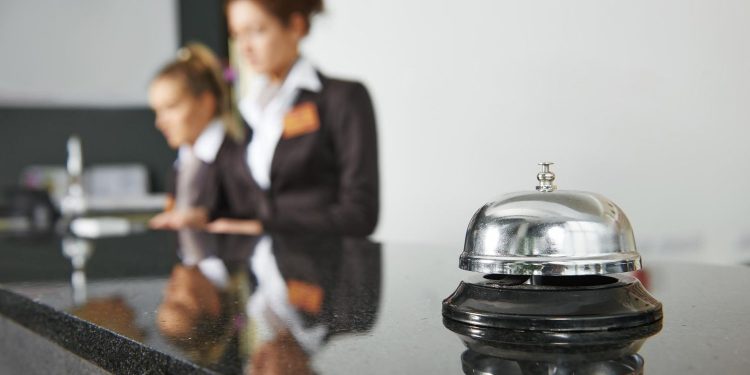As hospitality businesses gradually reopen, visitors want to know how hotels protect guests from COVID-19. Here are some things hotels can do to prepare.
Luxury travelers take 24-hour room service, spa and salon services, and a concierge who can snag a hot table at a fully booked restaurant for granted. But the pandemic has changed much of what is reasonable to expect. By following CDC, WHO, and health department guidelines, hotels can reassure guests that it is OK to return. Learn more about how hotels protect guests from COVID-19.
Cleaning High-Touch Surfaces
You won’t find unmasked smiles or handshakes, but hotels are investing in more cleaning and disinfecting, with special attention to high-touch surfaces. Elevator buttons, ice machines, handrails, and lobby tables will get wiped down several times a day.
Luxury hotels had already begun adopting no-touch technology. Cellphones become room keys. Apps allow guests to request or defer housekeeping to specific times, to avoid encounters with staff. In-room tablets control everything from light switches to temperature on one easy-to-clean surface. Hotels are training housekeeping staff how to use sanitizers that must stay on surfaces until they evaporate to be effective. Linens must be laundered with added disinfectant.
Hotels that keep their salons open should offer staff PPE, including masks and face shields, and require guests to wear masks. Providing masks for guests is an obvious strategy. Workout rooms will get frequent cleaning and disinfecting with sanitizers approved for use against existing and emerging germs.
Hand Sanitizer Replaces Bowls of Mints
Front desk areas are high traffic zones. Guests will find signage reminding them of the need for social distancing and frequent handwashing. Staff will sanitize countertops frequently and hand sanitizer replaces the candy dish. No-touch, paperless check-in and -out is already familiar to guests at luxury properties.
Changes in Food Service
Buffets are probably over for good. Hotels that offer several dining options know how to run efficient hotel kitchens. They can spread out guests between outdoor dining options and different restaurants, maintaining social distancing. Hotels with nimble kitchens can pivot quickly from plating several dishes and sending them out to tables to bagging entire meals, using disposable containers and utensils. Room service will work more like no-contact, take-out delivery. Physical menus will disappear, and orders will be transmitted through the hotel’s app or in-room tablets.
Ventilation
One area that hasn’t gotten enough attention is how HVAC systems in buildings may contribute to the spread of COVID-19. Evidence is building that good ventilation and access to outdoor air is an important safety measure. An important way hotels can protect guests from COVID-19 is by retrofitting HVAC systems to increase air exchange and by adding HEPA filters. The best solution is familiar to luxury travelers: windows and doors that admit outside air. Most luxury resorts provide private outdoor space, and some in warm climates provide private dipping pools.
The pandemic has changed luxury travel but hasn’t ended it entirely. Hotels will reopen, finding ways to make spas, workout rooms, and pools enticing, even with masks and capacity limitations in place.




